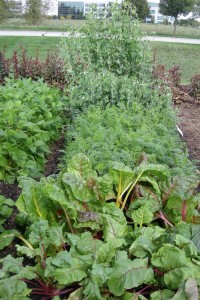
Marion County Master Gardeners' 600 square-foot demonstration garden grew about 400 pounds of food. (C) Jo Ellen Meyers Sharp
All over the country, people who’d never sprouted a seed, planted a vegetable garden this year, and many of those who’d grown their own food for years, expanded their plots.
Seed merchants report jumps of 10- to 60 percent in vegetable seed sales in 2009. The number of home gardeners grew 40 percent this year over last, according to the National Gardening Association.
Even people without land wanted to garden.
Local requests for information about community gardens — from where they are to how to start one — went from one every three months in 2008 to three or four a week in 2009, said Ginny Roberts, urban garden coordinator for the Marion County Extension Office. Master Gardeners fielded about a dozen queries and made several on-site consultations to help people start community gardens, said Steve Mayer, the extension educator who oversees the volunteers.
It doesn’t take much space to make a difference.

Lettuces, tomatoes, corn, beans, peas and other produce valued at nearly $400 was donated from the Marion County Master Gardeners demo garden. (C) Jo Ellen Meyers Sharp
This past summer, Master Gardeners developed a 600-square-foot demonstration garden outside the extension’s office at Intech Park. Even though the garden did not get planted until mid-July, nearly 400 pounds of beans, peas, tomatoes, lettuces and other food have been donated to a food bank, and the harvest is not yet complete, Mayer said. To date, food valued at $737.37, based on the National Gardening Association’s formula of $2 a pound, has been donated.
If you’d like to create your own garden or develop a community garden in your neighborhood, or at your church, apartment complex or business, please visit the community garden Web site.
This is the time of year we give thanks for the blessings in our lives. We thank Mother Nature for helping us grow the food we eat, which seems to taste even better when we’ve grown it ourselves. We also feel good when we share our bounty with friends, family and those in our community who are in need of good food.
Your readers with late season herb and vegetable gardens may well find that they will grow more than they can use, preserve or give to friends.
They may want to visit http://www.AmpleHarvest.org – a site that helps diminish hunger by enabling backyard gardeners to share their crops with neighborhood food pantries.
The site is free both for the food pantries and the gardeners using it.
More than 1150 food pantries nationwide are already on it and more are signing up daily.
It includes preferred delivery times, driving instructions to the pantry as well as (in many cases) information about store bought items also needed by the pantry (for after the growing season).
AmpleHarvest.org enables people to help their community by reaching into their back yard instead of their back pocket.
Lastly, if your reader’s community has a food pantry, they should make sure the pantry registers on http://www.AmpleHarvest.org. Its free.